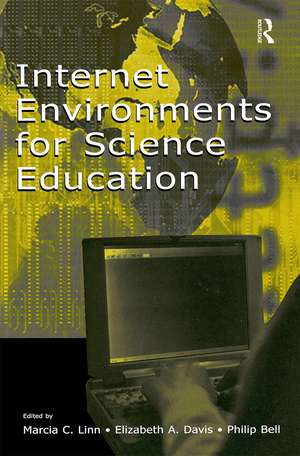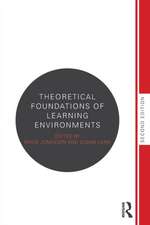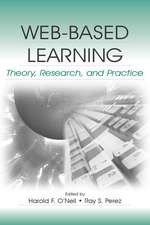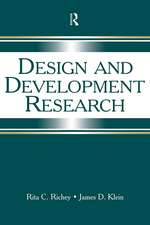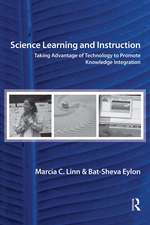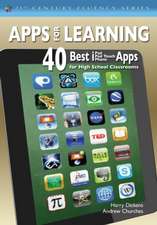Internet Environments for Science Education
Editat de Marcia C. Linn, Elizabeth A. Davis, Philip Bellen Limba Engleză Paperback – 29 mar 2004
The methodology--design-based research studies--enables investigators to capture the impact of innovations in the complex, inertia-laden educational enterprise and to use these findings to improve the innovation.
The approach--technology-enhanced inquiry--takes advantage of global, networked information resources, sociocognitive research, and advances in technology combined in responsive learning environments.
Internet Environments for Science Education advocates leveraging inquiry and technology to reform the full spectrum of science education activities--including instruction, curriculum, policy, professional development, and assessment. The book offers:
*the knowledge integration perspective on learning, featuring the interpretive, cultural, and deliberate natures of the learner;
*the scaffolded knowledge integration framework on instruction summarized in meta-principles and pragmatic principles for design of inquiry instruction;
*a series of learning environments, including the Computer as Learning Partner (CLP), the Knowledge Integration Environment (KIE), and the Web-based Inquiry Science Environment (WISE) that designers can use to create new inquiry projects, customize existing projects, or inspire thinking about other learning environments;
*curriculum design patterns for inquiry projects describing activity sequences to promote critique, debate, design, and investigation in science;
*a partnership model establishing activity structures for teachers, pedagogical researchers, discipline experts, and technologists to jointly design and refine inquiry instruction;
*a professional development model involving mentoring by an expert teacher;
*projects about contemporary controversy enabling students to explore the nature of science;
*a customization process guiding teachers to adapt inquiry projects to their own students, geographical characteristics, curriculum framework, and personal goals; and
*a Web site providing additional links, resources, and community tools at www.InternetScienceEducation.org
| Toate formatele și edițiile | Preț | Express |
|---|---|---|
| Paperback (1) | 477.00 lei 6-8 săpt. | |
| Taylor & Francis – 29 mar 2004 | 477.00 lei 6-8 săpt. | |
| Hardback (1) | 956.07 lei 6-8 săpt. | |
| Taylor & Francis – 30 mar 2004 | 956.07 lei 6-8 săpt. |
Preț: 477.00 lei
Preț vechi: 561.18 lei
-15% Nou
Puncte Express: 716
Preț estimativ în valută:
91.28€ • 94.76$ • 76.12£
91.28€ • 94.76$ • 76.12£
Carte tipărită la comandă
Livrare economică 22 martie-05 aprilie
Preluare comenzi: 021 569.72.76
Specificații
ISBN-13: 9780805843033
ISBN-10: 0805843035
Pagini: 440
Dimensiuni: 152 x 229 x 23 mm
Greutate: 0.59 kg
Ediția:1
Editura: Taylor & Francis
Colecția Routledge
Locul publicării:Oxford, United Kingdom
ISBN-10: 0805843035
Pagini: 440
Dimensiuni: 152 x 229 x 23 mm
Greutate: 0.59 kg
Ediția:1
Editura: Taylor & Francis
Colecția Routledge
Locul publicării:Oxford, United Kingdom
Public țintă
ProfessionalCuprins
Contents: D. Kirkpatrick, Foreword. M.C. Linn, E.A. Davis, P. Bell, Introduction. Part I: Starting Points. M.C. Linn, E.A. Davis, P. Bell, Inquiry and Technology. M.C. Linn, B-S. Eylon, E.A. Davis, The Knowledge Integration Perspective on Learning. M.C. Linn, E.A. Davis, B-S. Eylon, The Scaffolded Knowledge Integration Framework for Instruction. P. Bell, C.M. Hoadley, M.C. Linn, Designed-Based Research in Education. Part II: Curriculum Design Patterns for Knowledge Integration. E.A. Davis, Creating Critique Projects. P. Bell, Promoting Students' Argument Construction and Collaborative Debate in the Science Classroom. C.M. Hoadley, Fostering Productive Collaboration Offline and Online: Learning From Each Other. D. Clark, Hands-on Investigation in Internet Environments: Teaching Thermal Equilibrium. Part III: New Partnerships. J.D. Slotta, The Web-Based Inquiry Science Environment (WISE): Scaffolding Knowledge Integration in the Science Classroom. P. Bell, The Educational Opportunities of Contemporary Controversies in Science. E. Baumgartner, Synergy Research and Knowledge Integration: Customizing Activities Around Stream Ecology. L. Shear, P. Bell, M.C. Linn, Partnership Models: The Case of the Deformed Frogs. Part IV: Next Steps. M.C. Linn, P. Bell, E.A. Davis, Specific Design Principles: Elaborating the Scaffolded Knowledge Integration Framework. M.C. Linn, E.A. Davis, P. Bell, B-S. Eylon, Closing Thoughts: Internet Environments for Science Education.
Notă biografică
Marcia C. Linn (University of California, Berkeley), Elizabeth A. Davis (University of Michigan) and Philip Bell (University of Washington)
Recenzii
"The major strengths of this book are that the editors see such environments as pedagogical/educational tools to help teach inquiry (as epistemology) instead of using inquiry to teach science, the very strong psychological basis for learning and instruction provided, and the brilliant exposition of good design practice..."
—British Journal of Educational Technology
"Internet Environments for Science Education provides a detailed, positive, and practical guide to the new forms of teaching, curriculum organization, and research that are necessary if we are to capitalize on the potential of computers and the Internet to revolutionize education. Although Linn, Davis, and Bell concentrate on science, researchers and teachers of all subjects will value the principles and methods that they describe."
—Richard White
Emeritus Professor, Monash University
"Mining the ambitious and prolific program of research conducted by Professor Linn and her colleagues, E. Davis and P. Bell, this volume offers a broad range of intellectual and material resources for supporting the design, enactment, and evaluation of inquiry-based science teaching to advance students' scientific concepts and reasoning. It is distinguished by its principled treatment of the affordances of technology in interplay with the rich, dynamic, and complex contexts of classroom communities."
—Annemarie Sullivan Palincsar
University of Michigan
"Marcia Linn, with Elizabeth Davis and Philip Bell, unite basic cognitive research with high quality practical advice on how to run successful science classrooms."
—Naomi Miyake
Chukyo University
—British Journal of Educational Technology
"Internet Environments for Science Education provides a detailed, positive, and practical guide to the new forms of teaching, curriculum organization, and research that are necessary if we are to capitalize on the potential of computers and the Internet to revolutionize education. Although Linn, Davis, and Bell concentrate on science, researchers and teachers of all subjects will value the principles and methods that they describe."
—Richard White
Emeritus Professor, Monash University
"Mining the ambitious and prolific program of research conducted by Professor Linn and her colleagues, E. Davis and P. Bell, this volume offers a broad range of intellectual and material resources for supporting the design, enactment, and evaluation of inquiry-based science teaching to advance students' scientific concepts and reasoning. It is distinguished by its principled treatment of the affordances of technology in interplay with the rich, dynamic, and complex contexts of classroom communities."
—Annemarie Sullivan Palincsar
University of Michigan
"Marcia Linn, with Elizabeth Davis and Philip Bell, unite basic cognitive research with high quality practical advice on how to run successful science classrooms."
—Naomi Miyake
Chukyo University
Descriere
Internet Environments for Science Education synthesizes 25 years of research to identify effective, technology-enhanced ways to convert students into lifelong science learners--one inquiry project at a time. It offers design principles for dev
